|
FAQs on Anemone Identification
37
Related Articles: Anemones,
Bubble
Tip Anemones, LTAs, Cnidarians, Coldwater Anemones, Colored/Dyed Anemones,
Related FAQs: Anemone ID 1, Anemone ID 2, Anemone ID 3, Anemone ID 4, Anemone ID 5, Anemone ID 6, Anemone ID 7,
Anemone ID 8,
Anemone ID 9, Anemone ID 10, Anemone ID 11,
Anemone ID 12,
Anemone ID 13, Anemone ID 14, Anemone ID 15, Anemone ID 16, Anemone ID 17, Anemone ID 18, Anemone ID 19, Anemone ID 20, Anemone ID 21, Anemone ID 22, Anemone ID 23, Anemone ID 24, Anemone ID 25, Anemone ID 26, Anemone ID 27, Anemone ID 28, Anemone ID 29, Anemone
ID 30, Anemone ID 31, Anemone ID 32, Anemone ID 33, Anemone ID 34, Anemone ID 35, Anemone ID 36, Anemone ID 38, Anemone ID 39, Anemone ID 40, Anemone ID 41,
Anemone ID 42,
Anemone ID 43,
Anemone ID 44, Anemone ID 45,
& Cnidarian Identification, Anemones 1,
Anemones 2, Anemones 3, Anemones
4, Anemones 5, Invertebrate Identification, Aiptasia
Identification, Aiptasia ID
2, LTA
Identification, Bubble Tip
Anemones, Caribbean
Anemones, Condylactis, Aiptasia
Anemones, Other Pest
Anemones, Anemones and
Clownfishes, Anemone
Reproduction, Anemone
Lighting, Anemone Feeding,
Anemone Systems,
Anemone
Compatibility, Anemone
Selection, Anemone
Health, Anemone Behavior,
Anemone
Placement,
|

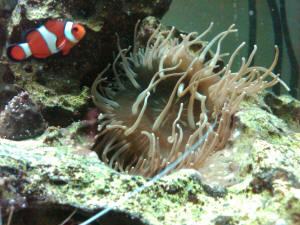
|
 |
New Print and
eBook on Amazon:
Anemone Success
Doing what it takes to keep Anemones healthy long-term
by Robert (Bob) Fenner
|
|
Anemone ID 8/29/10
Hello Crew at WWW,
My friend has this anemone that dropped a little baby. I have
searched your site for over two hours now and I've seen some
cool things but nothing like this anemone. The picture is
attached. It's about the size of a volleyball and It's
only a side view so unfortunately you can't see the big huge
lips on it. It looks like it's always puckering for a
kiss.
Before I take the little baby he offered me (the size of a dime)
I would like to know what I'm getting in to. The LFS that he
bought this thing from don't even know what it is. Any
ideas?
Thank for the great site!
Rhonda
<Likely a Magnificent... not easily kept. Read here:
http://www.wetwebmedia.com/marine/inverts/cnidaria/anthozoa/hetmagnifica.htm
and the linked files above. Bob Fenner>
|
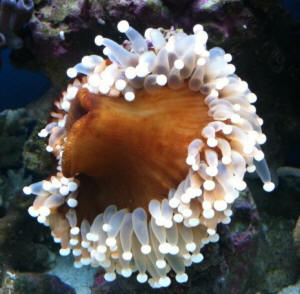 |
Anemone ID and Help 8/28/10
Good Morning,
<Hello Garrett>
asking for help ( yet again, thanks for supporting us).
<You're welcome.>
As I get older I wake up earlier. With this extra time and later
starting class this morning, I decided to do something I haven't
done in ALONG time.
I grabbed a flashlight and spent some time "night diving"
with my 3 year old 70 gallon reef tank. I've been down the
apistasia <Aiptasia> road before. You might frown upon me but
after trying shrimps, and chemicals, I finally got rid of them using
Berghia.
<A proven method.>
I tried saving as many as possible by giving them to a friend when they
efficiently wiped out my problem. This morning I found 3 small, and one
LARGE anemones. These do look a little different than the traditional
brownish, long tentacle ones in the past. For one, these have
alternating long and short tentacles, it is a much whiter appearance.
The kicker is that it "retreats" back to around the rock into
the dark when the Halides come on. Only is out at night which is why I
haven't seen it. ( I scan my tank every day when I get home from
school). The 3 other very small ones I have get pushed back down by my
super green Zoos when the lights come on, indicating that they
don't sting the coral. I've tried scanning the
archive, emailing you as last resort. Will Berghia eat these, are they
capable of over taking my tank, do we know what these could be?
<Berghia are not known to eat anemones other than Aiptasia. Without
a pic it would be close to impossible to ID what you have. Bob may have
an idea and if so will comment here.>
Thanks for your valuable time.
<You're welcome. James (Salty Dog)>
|
ID Please 8/11/10
Hello , Crew, I have attached a photo in the hopes that you
wonderful folks can ID this for me . I first saw this about a
year ago and it was the size of a dime . Now it is the size of a
Toonie (Canadian, I am ) Has me puzzled ? I do think it is very
pretty, so hope it is harmless !Thank you in advance for all the
hard work and research you do .I sure do appreciate the fact that
you are here for me .Karrie Webster
<Mmm, appears to be an Anemone of the genus Telmatactis...
we've seen a spate of these recently. Please see here:
http://wetwebmedia.com/AnemIDF35.htm
Stinging, but small... Bob Fenner>
|
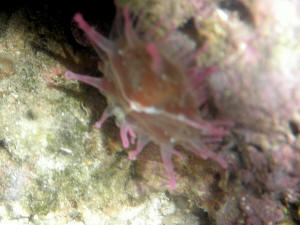 |
|
Anemone ID: Telmatactis spp. 8/9/10
Hi guys!
<Hi Dan, Lynn here today!>
Can you guys help me ID this?
<Yep, I just ID'd one of these a little over a week ago.
It's an anemone in the genus Telmatactis, family
Isophelliidae, aka the 'club-tipped' anemone. Please see
the following links for examples of various species:
http://www.natuurlijkmooi.net/caribische_zee/bloemdieren/telmatactis_americana.htm
http://www.poppe-images.com/?t=33&search=telmatactis >
Apologies on the picture quality. I am definitely not a
photographer (did get a bunch of photos of the glass, though
lol).
<Been there, done that! No worries on the photos. Although I
can't give you a species-level ID, I can narrow it to genus
level based on the overall look and club-shaped tentacle
tips.>
The first photo has the truest color, but from what I've read
(all 35 anemone ID FAQs), that's not too important. Anyway,
on to the details. This little guy has a disc width of maybe 1
inch when fully opened. It came in on a small piece of live rock
(really small, almost rubble) from the Marshall Islands. It was
on the underside and seems to like dark areas, so I'm
assuming it's not too photosynthetic.
<That would be my guess as well, as the ones I've read
about as hitchhikers do seem to prefer shady/protected areas.
Some in the wild actually live in caves.>
I'm pretty sure that it is not Aiptasia, as it has a foot
(and uses it to move around a lot). There are 6 large tentacles
in the innermost ring
<That's another distinguishing factor, along with the
club-like tips.>
..and 38 small ones in the outside ring, with about half pointing
straight out and half pointing slightly upwards. It takes food
readily and is usually open night and day.
<Great observations!>
Any opinions as to what this is? Anemonia springs to my mind, but
I wasn't sure they were out in the middle of the Pacific. Or
could this be a juvenile anemone? I like it, but I'm worried
it might be a pest on the order of Aiptasia
<Unfortunately, there's not a whole lot of aquaria-related
information available on these anemones but the good news is that
the 'net isn't riddled with reports of them getting out
of hand or causing problems so I think you're okay.
Here's what I know:
1. Telmatactis spp. tentacles have blunt, club-like tips. The
innermost ring (nearest the mouth) is comprised of six rather
stout tentacles.
2. Small/juvenile individuals of some species are carried about
by crabs in the genus Polydectus (teddy bear crabs) and Lybia
(boxing crabs), presumably for protection/defense, possibly for
help in foraging.
3. They frequently have symbionts living on/around them,
including the following shrimps: Lysmata grabhami (Caribbean
scarlet cleaner shrimp), Thor amboinensis ('sexy' shrimp)
and various crabs, including those in the genus: Pilumnus,
Dromia, and Liocarcinus.
4. Some species like to burrow in sediments; others live in
protected areas, under rock overhangs or within caves.
5. Size varies according to specie, but most reported as
hitchhikers tend to remain fairly small (an inch or two).
6. As with other anemones, they have the potential to sting, so
avoid skin contact. They may also sting corals, so if you see
your individual encroaching on your favorite Acropora, you might
want to deal with it as you would Aiptasia.
7. Regarding livestock, these anemones will likely consume a fish
if one blunders into its tentacles. Luckily, the tentacles are
fairly short and less dense (as compared to other anemones) so
that lessens the threat a bit. Plus, most fishes know to steer
clear of anemones anyway, so that helps.
8. Feeding: If you wish to keep the anemone, you can offer it
occasional small meaty bits of marine origin
(shrimp/fish/Mysis/clam/etc.) using a turkey baster or feeding
stick.>
..(had a run-in with those, barely survived).
<They can certainly be a pain alright, but good on you for
getting rid of them!>
If possible, I would like to know quickly so I can eradicate.
It's currently in a rubble area and therefore easily
removable, but I don't know how long it'll stay there
:(.
<That's true. If it becomes a problem, deal with it as you
would Aiptasia. For right now, I'd leave it but keep an eye
on it.>
Thank you for your help! Love your site!
<You're very welcome and thank you!>
Dan
<Take care, Lynn Z>
|
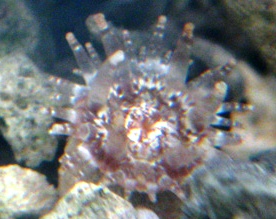 |
|
Unknown Critter ID? Telmatactis spp. Anemone --
7/31/10
Greetings,
<Hello Penny, Lynn here today.>
We discovered this animal in one of our 220g reef tanks. It acts
similar to an Aiptasia in that it can quickly retract into a
hole. It's not in direct light, it prefers a shaded area.
<Typical behavior for these.>
Research has been done with no positive ID. Do you have any idea
what this is?
<Yep, it looks like a species of Telmatactis (aka
'club-tipped' anemones), in the family Isophelliidae.
Please see the following links for examples of various species:
http://www.natuurlijkmooi.net/caribische_zee/bloemdieren/telmatactis_americana.htm
http://www.poppe-images.com/?t=33&search=telmatactis
Thank you in advance for your help!
<You're very welcome!>
Penny Harkins
<Take care, Lynn Z>
AquaCorals - Saltwater Reef Aquariums
34 Currier Road, Fairfield, ME 04937
"Reefers Grow Their Own"
<http://www.AquaCorals.com> www.AquaCorals.com
|
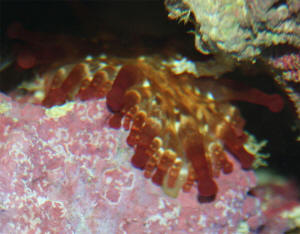 |
|
Blue/Purple Aiptasia? 7/29/10
Dear crew,
<Pete>
I have been wondering whether this blue/purple anemone is just
another Aiptasia or something different?
<Umm, there are a couple of Glass Anemones to the lower left
of the pic you've sent and what appears to be a Macrodactyla
doreensis to the right... that is purplish>
It has been growing in my somewhat neglected 3-gallon tank for
about 6 months now but I always thought it was just another
Aiptasia until I noticed its color.
What do you think?
With thanks,
Peter Robertson
<Mmm, read here:
http://www.wetwebmedia.com/marine/inverts/cnidaria/anthozoa/anemones.htm
and elsewhere on WWM re Cyanobacteria... you've quite a patch
to the right.
Bob Fenner>
|
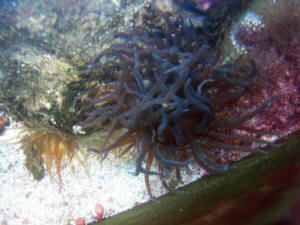 |
|
Re: Blue/Purple Aiptasia? 7/30/2010
Thanks for the response, Bob.
<Welcome Peter>
It is encouraging to finally get a hitchhiker anemone that
isn't a pest!
<Is a beauty, a real prize>
I will take your advice and clean up the tank to give this
anemone a chance to grow. Now that I think about it, it
wasn't there four months ago when I brought the tank home
from work. It has been growing quickly.
Sincerely,
Peter
<BobF>
|
Anemone ID 7/25/10
Dear WWM Crew,
<Ashley>
Hello! I hope you are enjoying your weekend so far. I come to you
seeking help identifying my new anemone, as well as suggestions for
getting it to anchor to a rock.
I have recently purchased the anemone from my LFS and I can neither
remember what it was called, nor can I figure out what it is by
searching the web.
My camera is MIA, so I will describe it the best I can. The base is a
pinkish color, then the underside is light blue/white with yellow
spots. The tentacles are a light neon blue color, and the mouth area
and body is white.
The tentacles are about 2-3" long, and there are no bubbles on the
ends.
Any idea what this might be?
<Mmm "sounds" like a Macrodactyla doreensis... see
here:
http://www.wetwebmedia.com/marine/inverts/cnidaria/anthozoa/anemones.htm
Most of these are easily lost/die, due to poor initial health and
purchase
by folks who don't know how to care for them>
Also, It has been floating around in my tank since I brought it home a
few days ago. Is there anything I can do to get it to stay put?
<Read the linked files above the prev. citation re Behavior and
Systems>
I tried turning off the pump and powerheads to keep it from floating
away, but it let go when I turned them on. I also tried putting a big
fish net over the top of the anemone for about 24 hours to keep it in
one spot, but as soon as I moved it away it let go of the rock again
soon after.
<These are good trials, worth trying; but if the animal is injured
(the pedicle/foot) or the system unsuitable light, water quality
wise... it won't adhere or survive here>
Thanks in advance. All of you are always so helpful. Have a great
weekend!
Sincerely,
Ashley
<Whipping past, Bob Fenner>
|
Anemone ID 7/22/10
HEY WWM!!!!
So me and my girlfriend got into a dispute about the ID of this
frag we purchased today. Is it possible to clear up our confusion
and positive ID from this photo? It is florescent and able to
recede.
Thank you,
M & L
<Mmm, could be a Euphyllia sp., but most likely an Anemonia
majano. Bob Fenner>
|
 |
|
Re: Anemone ID 7/24/10
I guess the image is not very good. It doesn't really look
like any majano or images of it that I have ever seen. It likes
to extend during the day time and extends to about double the
size in the image. There is a
skeletal cup
<Oh! Then scratch Anemonia/Actinarians period... I'll
default to my "B" choice... This is likely Euphyllia
glabrescens... See here:
http://wetwebmedia.com/caryoeuph2.htm
or on the Net...>
that they recede into during the night time, and the florescent
colors are very vivid. There does not seem to be a mouth in the
middle. I thought that it was Euphyllia Glabrescens,
<Oh! I do agree>
my girlfriend thinks it is some kind of bubble tip.
<... not Entacmaea... Anemones don't have hard skeletal
parts>
Is there a distinct way to differentiate between the three
options? Also could it be a lavender mushroom?
<Doubtful>
There are some images of it that look strikingly similar as
well.
<BobF>
|
|
Re: Anemone ID... Not dying
7/1/10
update
Hey all
I believe/hope my bleached anemone is recovering. I attached
before and after photos taken 6 weeks apart. I still am not sure
what kind it is. (my clowns seem to like it regardless)
Am I correct in thinking its getting better? Can it now be
identified?
Sebae?
Thanks for your help.
Steve
<Yes!, and likely Heteractis crispa. BobF>
|
  |
|
|

